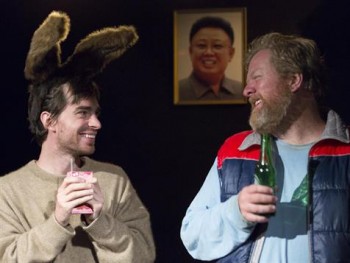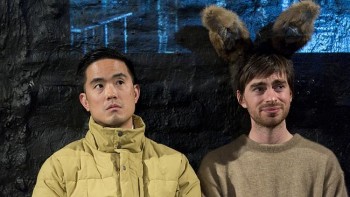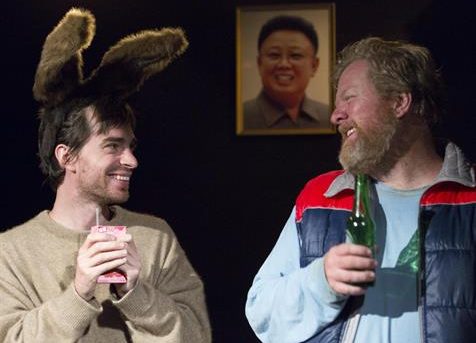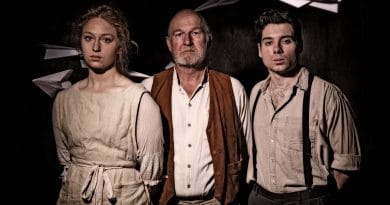A Rabbit for Kim Jong-Il
A Rabbit for Kim Jong Il, is surprisingly, actually about rabbits for Kim Jong Il. Kit Brookman’s new work is based on the ridiculous true story of a German breeder who bred ‘monster’ rabbits, which attracted the interest of the North Korean government. Originally, it was stated that the interest was for a new breeding program to decrease famine in the DPRK, however after suspicious circumstances the breeder suspects his rabbits were consumed for the Dear Leader’s birthday.
In Brookman’s play we are taken on this odd (embellished and now fictional) journey, with the added absurd elements of talking rabbits and espionage.

Brookman’s script, with Lee Lewis’ endearing direction, offers some light-hearted, humorous moments – particularly during the opening scene as Johann, the breeder, is forced to make his deal with Chung, the North Korean representative. We are presented with a lonely man whom for many years has taken solace in his solitude due to his perceived breeding accomplishments. When the opportunity to have his accomplishments recognised arises, Johann is led down a path that he soon regrets. Near the conclusion of this opening scene, the stakes are dramatically raised and we’re reminded of the severity of the political backdrop behind this quaint story about rabbits.
As the play shifts location to North Korea, we are engrossed into a country of people who worship, either willingly or not, their dear leader, and the play heightens in dramatic intensity and suspense.
In the play’s North Korea, a lot of the interactions become more stilted and reserved, as a reflection of the dictated lifestyle. This serves well to reflect the highly politicised culture and drives home the peoples’ obsession with their Dear Leader; however, it does make these scenes less enjoyable to watch. We are thrust into an odd melange of peculiar comedy, and dramatic thriller, that doesn’t always blend seamlessly. The stakes dramatically heighten far too swiftly and take us into a world of espionage and betrayal slightly incredulously. (Although, we are in a play with a talking rabbit so realistic story telling is evidently not the work’s main function).
Kaeng Chan as Chung Dae-hyun and Mémé Thorne as Park Chun-hei are reserved and controlled, giving clear representations of the indoctrinated, military characters they portray. Chan portrays an engaging arc, from the conservative, direct soldier on a mission who starts the show, to broken and regretful man, fearful of the consequences of his failure. Thorne as the military superior is often cold and calculating, whilst emphasising her obsession with her leader. Her worship and mania is extremely evident in an intimate moment she shares with Felix, the giant rabbit. This scene is a confronting reflection of how deprivation and propaganda drive people to preposterous lengths. However, this far-fetched leap in the story makes it more difficult to fully understand and empathise with the characters.
Steve Rodgers as Johann Wertheim is amiable and charming at times, but also demonstrates the full extent of Johann’s loneliness and consequent desperation. Kate Box as Sofie Amsel brings a vibrant energy and enthusiasm to her quirky character that reveals many unexpected twists in the story, which Box handles with humour and ease. Kit Brookman as Felix the rabbit is gentle and placid, finding the wry aspects of his reserved character.

During the show we transition from Johann’s bare and unkempt house, to the slick, North Korean hotel room, and even end up in Felix’s enclosure at times. Elizabeth Gadsby’s simple set is highly effective in transporting us between scenes whilst leaving a lot of the details of the setting to our imagination. Luiz Pampolha’s lighting design complements the set well, particularly adding suspense in some of the later scenes.
Throughout the show, we are given a clear picture of a man who for so long has isolated himself from the world in order to foster his crazy dream, which he later grows to resent. He pursues a path that leads to regret and guilt, and he is forced to question whether he will be able to forgive himself. Johann’s own plight raises concerns about how far one will go, and what happens when our poor choices have inconceivable consequences.
However, the more poignant message that at times overpowers these humbler questions is that of a political nature. This play brings to light a weighty political reality we often ignore and demands a response.




